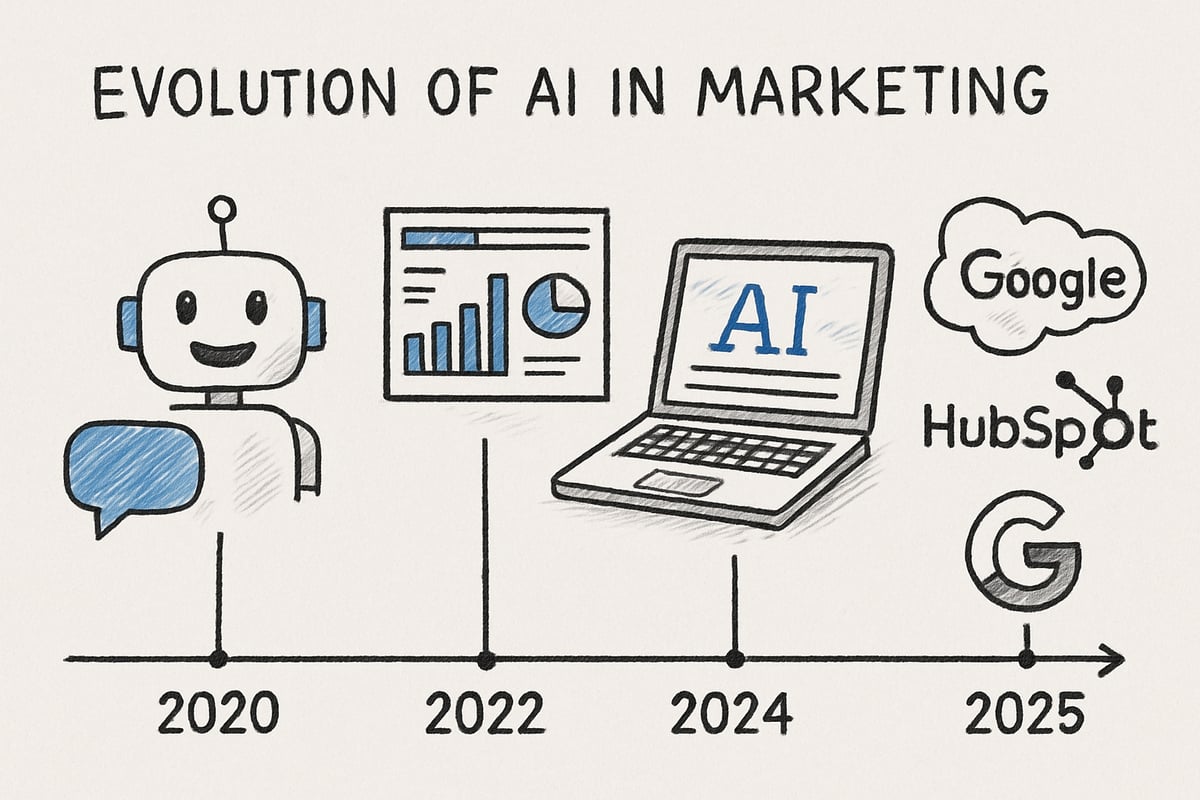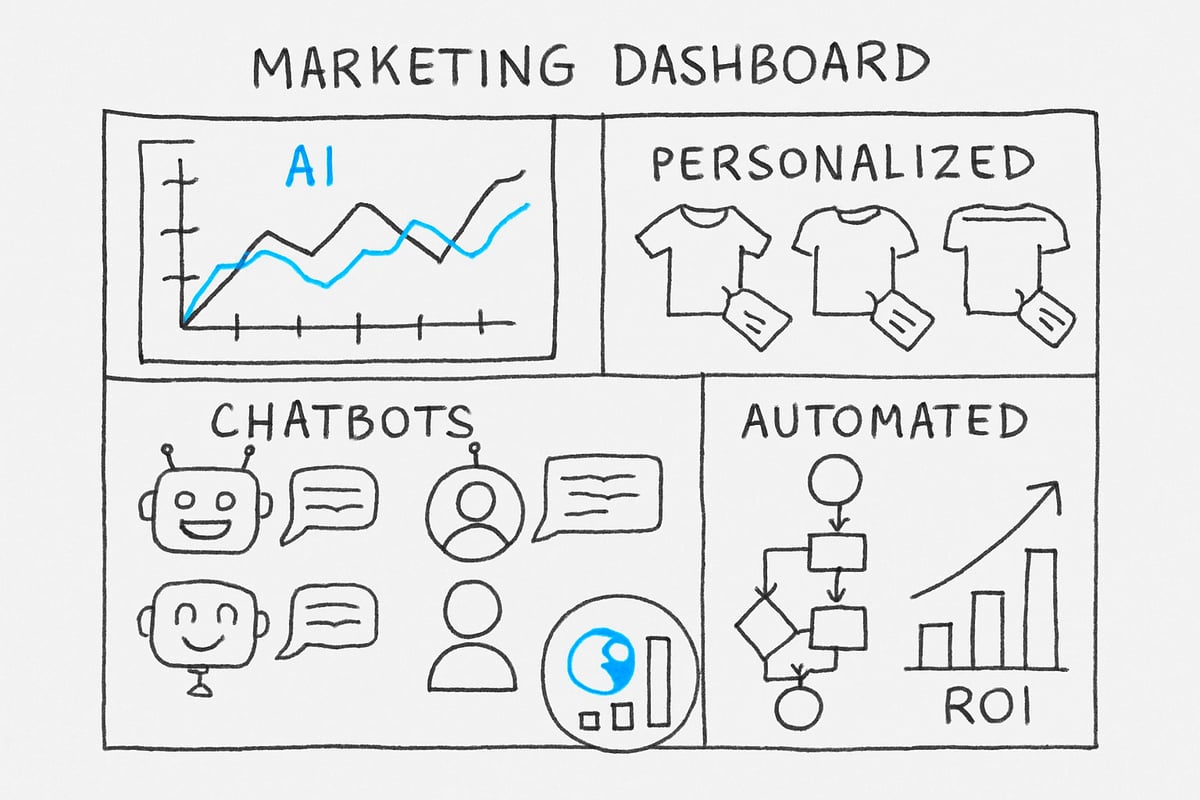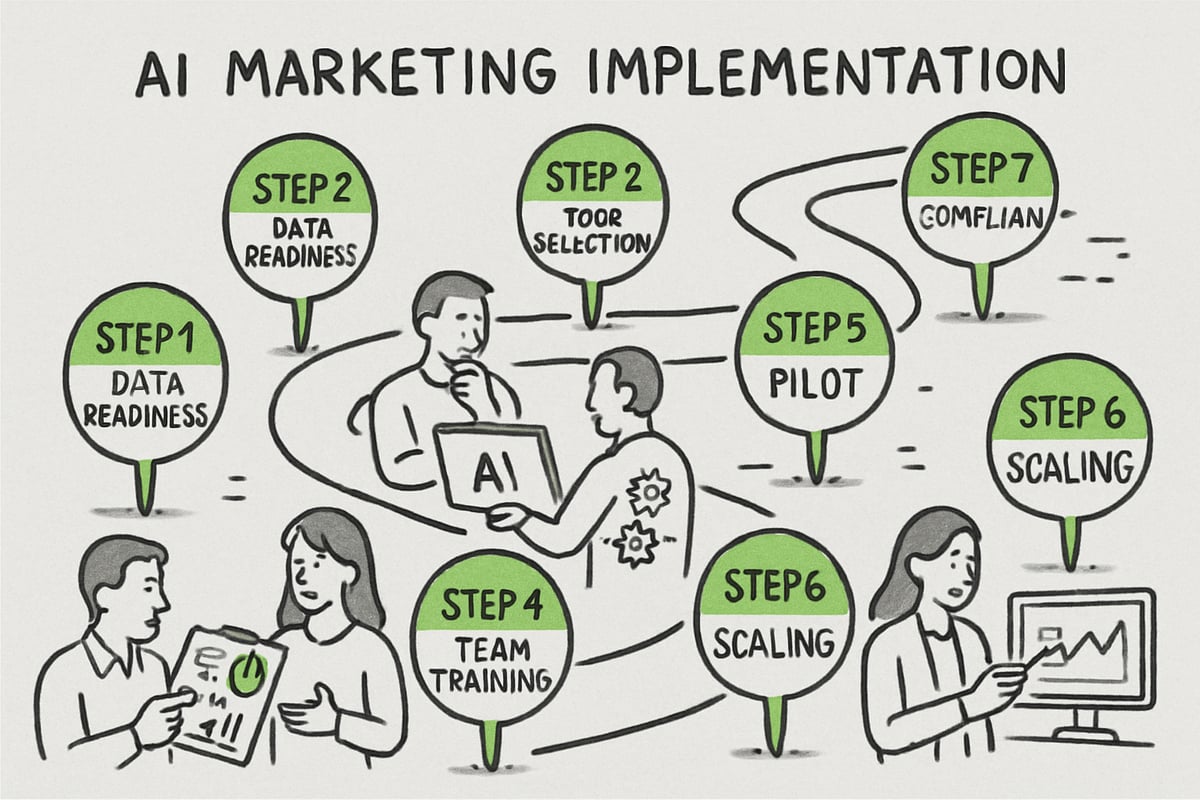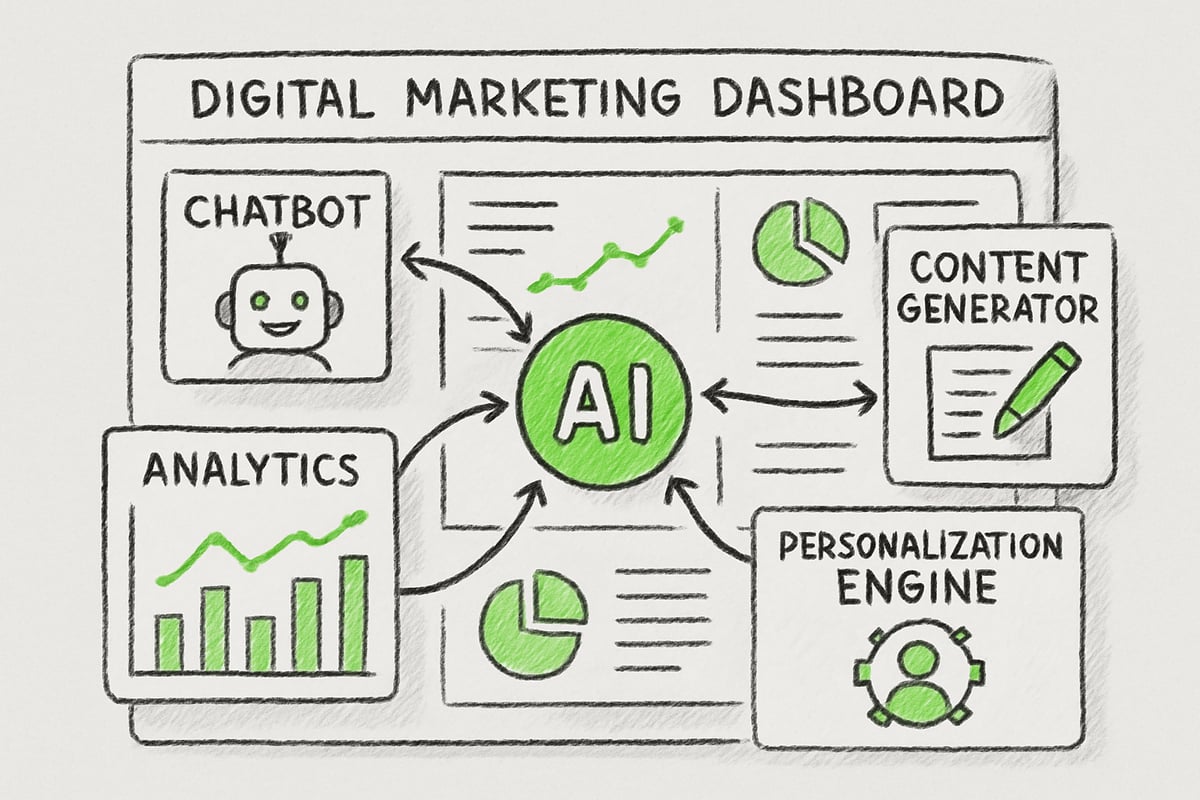Artificial intelligence is reshaping the marketing landscape at a pace never seen before. In 2025, businesses are witnessing AI-driven innovation that transforms how brands connect with customers.
This essential guide explores how marketing with ai is redefining strategies, tools, and outcomes for companies of all sizes. Whether you’re a startup or an enterprise, understanding these shifts is crucial.
You’ll discover the latest AI trends, practical benefits, step-by-step implementation, top tools, ethical considerations, and what the future holds. Ready to gain a competitive edge? Let’s dive into the world of AI-powered marketing.
The State of AI in Marketing for 2025
Artificial intelligence is reshaping how marketers connect, analyze, and grow. The landscape for marketing with ai has changed dramatically in recent years, setting new standards for efficiency and innovation. Let’s explore where we stand in 2025.

Evolution of AI in Marketing
The journey of marketing with ai has accelerated from early experimentation in 2020 to widespread adoption in 2025. Key milestones include the launch of generative tools like ChatGPT and DALL-E, which democratized content creation and campaign ideation.
In just five years, industry adoption rates soared. According to AI Adoption Rates in Marketing, 61% of marketers now leverage AI in their core strategies. This surge reflects a shift from basic automation to transformative, AI-first marketing models.
Generative AI’s rise, including image and text synthesis, has empowered marketers to deliver at unprecedented scale. Each advancement has contributed to a new baseline for marketing with ai, making it essential for businesses aiming to stay ahead.
Current AI Capabilities and Applications
Today’s marketing with ai solutions offer hyper-personalized experiences, powerful automation, and real-time analytics. Marketers use AI to segment audiences, automate chat interactions, and predict customer behavior.
Tools like chatbots handle routine queries, freeing human teams for strategic tasks. Predictive analytics guide content timing and channel selection, while AI-driven content generators produce tailored messages at scale.
A prime example is Netflix, whose AI-powered recommendation engine boosts user engagement by analyzing viewing habits. By the end of 2025, Gartner predicts 80% of customer interactions will involve AI, emphasizing how central marketing with ai has become for achieving personalization and efficiency.
Market Leaders and Innovators
Leading the charge in marketing with ai are tech giants like Google, Salesforce, and HubSpot. These companies have integrated AI into their platforms, enabling everything from automated lead scoring to dynamic content personalization.
Notable startups are also making waves. Emerging disruptors focus on niche solutions, such as AI-driven influencer matching or micro-segmentation. For example, HubSpot’s AI-powered marketing automation suite sets itself apart with intuitive workflows and deep CRM integration.
Here’s a quick comparison of key players:
| Company | Strengths | Differentiator |
|---|---|---|
| Ad optimization, analytics | Deep data integration | |
| Salesforce | Predictive analytics, CRM | Einstein AI platform |
| HubSpot | Automation, content generation | All-in-one marketing suite |
This dynamic mix of established leaders and agile startups ensures that marketing with ai continues to innovate rapidly.
AI Adoption Across Industries
Marketing with ai is no longer limited to a single sector. E-commerce brands use AI for product recommendations, while B2B and SaaS providers benefit from automated lead nurturing. In healthcare, AI personalizes patient outreach, and in finance, it enhances fraud detection and customer segmentation.
Retailers, for instance, rely on AI to suggest products based on browsing and purchase history, driving higher sales and engagement. Forrester reports 73% of retail marketers attribute increased sales to AI adoption.
From e-commerce to healthcare, marketing with ai is driving measurable results, proving its value across diverse industries.
Challenges and Barriers
Despite the promise of marketing with ai, several challenges persist. Data privacy and security remain top concerns, especially with regulations like GDPR shaping how data can be collected and processed.
Integration complexity is another barrier. Many organizations face hurdles when merging new AI tools with legacy systems. The skills gap is also significant, as marketers must upskill to fully leverage AI’s capabilities.
Key challenges include:
- Ensuring data privacy and compliance
- Overcoming technical integration issues
- Addressing talent and training needs
A practical example is the struggle to maintain GDPR compliance during AI-driven data collection. These hurdles highlight the importance of a thoughtful, compliant approach to marketing with ai.
Core Benefits of AI-Powered Marketing
Artificial intelligence is redefining what is possible in marketing with ai. Businesses now have the tools to reach audiences with unprecedented precision, speed, and relevance. From hyper-personalization to improved analytics, the core benefits of marketing with ai are both measurable and transformative.

Hyper-Personalization at Scale
One of the standout advantages of marketing with ai is delivering hyper-personalized experiences to each customer, no matter the audience size. AI-driven systems analyze vast datasets in real time, allowing marketers to tailor content, offers, and recommendations. For example, Amazon uses AI to suggest products based on browsing and purchase history, driving higher engagement.
Personalized emails, powered by AI, deliver six times higher transaction rates than generic messaging (Experian). Marketers can segment audiences dynamically and adjust campaigns on the fly. For a comprehensive look at how these techniques work in practice, explore the AI for Marketing Guide.
Enhanced Customer Insights and Analytics
Marketing with ai enables brands to unlock deeper insights into customer behavior. Predictive analytics tools can anticipate future trends, identify high-value segments, and optimize the timing of outreach. Real-time data interpretation means marketers can make informed decisions quickly.
A notable example is Sephora, which uses AI for advanced customer segmentation and personalized beauty recommendations. These insights drive smarter campaigns and maximize ROI. Marketers gain a clearer picture of what works, allowing for rapid strategy adjustments.
Automation and Efficiency Gains
Automation is a core benefit of marketing with ai, streamlining repetitive tasks and freeing up time for strategic planning. AI-powered tools handle ad targeting, manage chatbots, and oversee campaign execution with minimal manual input. Companies like Coca-Cola use AI for social listening, monitoring brand mentions across platforms and responding instantly.
According to McKinsey, AI reduces campaign management time by 30 percent. Marketers can automate A/B testing, budget allocation, and even creative generation. This efficiency leads to faster turnaround and more agile marketing operations.
Improved ROI and Conversion Rates
Businesses embracing marketing with ai consistently see stronger returns. AI-driven optimization tools test multiple variables, refine messaging, and adjust offers to boost performance. Booking.com, for instance, uses AI-based pricing strategies to maximize bookings and revenue.
A Deloitte study found that companies leveraging AI experience a 20 percent average increase in conversion rates. Through smarter targeting and ongoing campaign refinement, AI empowers marketers to achieve measurable growth and outperform competitors.
Step-by-Step Guide to Implementing AI in Your Marketing Strategy
Implementing marketing with ai requires a thoughtful, stepwise approach. Whether you are starting from scratch or upgrading your current strategy, following these seven steps ensures a smooth transition and maximizes ROI. Let's break down each phase for effective adoption.

Step 1: Assess Your Marketing Needs and Data Readiness
Before diving into marketing with ai, start by evaluating your current marketing landscape. Take inventory of all your data sources, such as CRM systems, website analytics, and previous campaign results.
Identify key goals, pain points, and gaps in your data. For example, are there missing touchpoints in your customer journey? Conduct a detailed audit to ensure your data is clean, accessible, and relevant for AI-driven insights.
A structured assessment sets the foundation for successful marketing with ai and helps you prioritize areas for improvement.
Step 2: Select the Right AI Tools and Platforms
Choosing the best tools is vital for marketing with ai success. Evaluate solutions based on your specific needs, budget, and technical resources. Decide whether an all-in-one platform or specialized tool fits your objectives.
Compare features such as natural language processing, automation capabilities, and integration options. For example, you might weigh Salesforce Einstein against Jasper AI for different use cases.
For an in-depth look at technology choices and integration strategies, see Marketing and AI Integration.
Step 3: Integrate AI with Existing Marketing Systems
Seamless integration is essential for effective marketing with ai. Leverage APIs and workflow automation to connect your new AI tools with existing platforms like your CRM, email service, or analytics dashboard.
Technical best practices include documenting workflows, mapping data flows, and testing integrations thoroughly. For instance, syncing AI chatbots with your customer database can personalize interactions in real time.
A smooth integration process ensures that marketing with ai delivers consistent, actionable insights across your organization.
Step 4: Train Teams and Foster AI Literacy
Empowering your team is a cornerstone of marketing with ai. Invest in upskilling through workshops, online courses, and certifications that focus on both AI fundamentals and practical applications.
Encourage knowledge sharing and internal collaboration to build confidence in using AI tools. For example, platforms like Google Skillshop offer tailored courses for marketers.
A well-trained team will maximize the value of marketing with ai and drive innovation throughout your campaigns.
Step 5: Pilot AI Campaigns and Measure Performance
Start small by piloting marketing with ai in a controlled setting. Define clear KPIs and benchmarks to measure success, such as engagement rates or conversion improvements.
Test AI-generated content, predictive analytics, or automated ad targeting on a limited audience. Use A/B testing to compare outcomes and gather actionable feedback.
By piloting campaigns, you can validate the impact of marketing with ai before scaling to broader initiatives.
Step 6: Scale and Optimize AI Initiatives
Once initial pilots succeed, expand your marketing with ai efforts across more channels and campaigns. Analyze performance data to identify what works and where improvements are needed.
Continuously iterate by refining targeting, messaging, and automation rules. For example, if AI-powered chatbots perform well on your website, consider deploying them on social media or in-app channels.
Optimization ensures that marketing with ai remains agile and responsive to evolving business needs.
Step 7: Ensure Compliance and Ethical Use
Responsible marketing with ai requires strict adherence to data privacy laws and ethical guidelines. Stay up to date with regulations like GDPR and CCPA, and document how customer data is collected and processed.
Implement transparent practices by disclosing AI-generated content and mitigating algorithmic bias. For example, always inform users when interacting with an AI-powered chatbot.
A focus on compliance and ethics safeguards your brand and builds trust as you advance in marketing with ai.
Top AI Marketing Tools and Platforms for 2025
Selecting the right tools is essential for success when marketing with ai in 2025. Companies now have access to a sophisticated ecosystem of AI-powered solutions that drive engagement, optimize campaigns, and personalize experiences at scale. Let us explore the top platforms shaping the landscape.

AI Content Creation and Copywriting
AI content generation tools have become foundational for marketing with ai. Leading platforms like Jasper, Copy.ai, and Writesonic use advanced language models to craft high-quality copy for blogs, ads, and emails.
Key features include natural language generation, tone and style customization, and SEO optimization. For example, Jasper AI enables marketers to produce long-form blog posts or ad copy in seconds, saving countless hours.
To compare their capabilities, see this summary table:
| Tool | Key Feature | Best For |
|---|---|---|
| Jasper | Long-form content, SEO | Blogs, websites |
| Copy.ai | Quick ad copy, templates | Social, email |
| Writesonic | Multilingual support | Global campaigns |
For a comprehensive review of these and other top solutions, explore AI Tools for Marketing.
AI-Powered Customer Engagement
Marketing with ai also transforms customer engagement. Chatbot platforms such as Drift, Intercom, and ManyChat deliver real-time support and lead generation across channels.
These tools use conversational AI to answer queries, qualify leads, and route conversations to human agents when needed. Intercom’s AI, for instance, handles routine inquiries and escalates complex issues, ensuring a seamless customer journey.
Key benefits include:
- 24/7 availability
- Personalized responses
- Integration with CRM and marketing automation systems
This approach elevates customer satisfaction and drives conversions.
Predictive Analytics and Data Insights
Predictive analytics is a cornerstone of marketing with ai. Tools like Salesforce Einstein and Adobe Sensei analyze vast datasets to forecast trends, score leads, and segment audiences.
Salesforce Einstein, for example, automates lead scoring and recommends next-best actions based on customer behavior. Adobe Sensei powers advanced segmentation and predictive modeling for targeted campaigns.
With these platforms, marketers gain:
- Actionable insights from real-time data
- Improved ROI through precise targeting
- Automated reporting and visualization
The result is a more informed, data-driven marketing strategy.
AI for Ad Campaign Optimization
Optimizing ad campaigns is another key benefit of marketing with ai. Google Performance Max and Meta Advantage+ use machine learning to automate bidding, creative testing, and audience targeting.
Google’s AI analyzes performance data, reallocates budgets, and tests ad variations to maximize results. Marketers can set objectives and let the platform optimize toward conversions or revenue.
Key features include:
- Automated budget allocation
- Dynamic creative testing
- Real-time performance insights
These platforms make campaign management more efficient and effective.
AI-Driven Personalization Engines
Personalization is at the heart of marketing with ai. Engines like Dynamic Yield and Optimizely tailor web experiences, product recommendations, and offers for each visitor.
Dynamic Yield, for example, enables e-commerce brands to serve unique product suggestions and content based on browsing behavior and purchase history. Optimizely powers real-time web personalization, improving engagement and sales.
Benefits of these tools include:
- Increased conversion rates
- Enhanced customer loyalty
- Scalable personalization across channels
As marketing with ai evolves, these platforms will continue to drive deeper connections with audiences.
Ethical Considerations and Challenges in AI Marketing
Artificial intelligence is reshaping the world of marketing with ai, but ethical considerations must remain at the forefront. As businesses adopt AI-driven solutions, they face new responsibilities in handling customer data, ensuring fairness, and maintaining transparency. Marketers must address these challenges to build trust and sustain long-term success.
Data Privacy and User Consent
With marketing with ai, data privacy has become a critical concern. Regulations like GDPR and CCPA set strict standards for how marketers collect and use personal information. Marketers must obtain clear consent, provide transparent data policies, and implement robust security measures.
Tools such as cookie consent managers help businesses comply with evolving laws. According to AI in Marketing Statistics 2025, a growing number of organizations are prioritizing privacy as they scale AI-powered campaigns. Failing to respect user consent can result in legal penalties and erode consumer trust.
AI Bias and Fairness
As marketing with ai becomes more widespread, the risk of algorithmic bias increases. AI models can inadvertently favor or exclude certain groups if trained on biased data. This can lead to unfair targeting, impacting both brand reputation and campaign effectiveness.
To mitigate bias, marketers should regularly audit AI systems and diversify training data sets. Transparency in how models make decisions is essential. By prioritizing fairness in their marketing with ai strategies, organizations can foster inclusivity and avoid ethical pitfalls.
Transparency and Trust in AI-Driven Campaigns
Building trust is vital in marketing with ai. Consumers want to know when AI is involved in their interactions, especially when content or recommendations are generated algorithmically. Disclosing the use of AI, such as labeling AI-generated emails or ads, supports transparency.
Explainable AI tools can help demystify how decisions are made. According to AI Marketing Predictions for 2025, brands that embrace transparency are more likely to be seen as trustworthy and ethical by their audiences. This approach strengthens customer relationships and brand loyalty.
Balancing Automation with Human Creativity
While marketing with ai streamlines many processes, it cannot fully replace human creativity and intuition. Automated systems excel at analyzing data and optimizing campaigns, but creative strategy, storytelling, and emotional resonance remain uniquely human strengths.
Marketers should use AI to handle repetitive tasks and gather insights while reserving creative decisions for skilled professionals. This balance ensures that marketing with ai enhances, rather than diminishes, the brand’s voice and authenticity.
The Future of AI in Marketing: Trends to Watch
As we look toward the future, marketing with ai is poised to reshape how brands connect, create, and compete. The next wave of innovation will go beyond automation, unlocking fresh possibilities for customer engagement, content creation, and ethical leadership. Here are the top trends that will define the evolution of marketing with ai in the coming year.
Generative AI and Creative Automation
Generative AI is revolutionizing marketing with ai by enabling brands to produce high-impact visuals, videos, and interactive assets faster than ever. Tools like DALL-E and Sora are empowering marketers to generate original imagery and dynamic content on demand. According to HubSpot, 40% of marketers plan to increase their use of generative AI in 2025. This shift is not just about efficiency, but also about unlocking new creative frontiers. For a deeper dive into industry expectations, see Expert Opinions on AI Expectations. As creative automation matures, expect to see more personalized, immersive campaigns that stand out in crowded digital spaces.
AI and Voice/Search Evolution
The evolution of voice technology is reshaping how consumers interact with brands, making marketing with ai more conversational and accessible. Voice assistants like Alexa and Google Assistant are now integral to search and shopping experiences. Comscore predicts that by 2025, 50% of all online searches will be voice-based. This trend means marketers must optimize their strategies for voice search and natural language queries. Conversational AI will also drive seamless, real-time customer support, helping brands stay present wherever and however their audiences engage.
Real-Time Personalization and Adaptive Journeys
AI is making it possible to deliver real-time, context-aware experiences at every step of the customer journey. In marketing with ai, personalization engines analyze behavior, preferences, and intent to present the right message or offer at the perfect moment. Adaptive journeys, powered by AI, adjust content and recommendations instantly as customers interact across channels. SaaS platforms are already leveraging these capabilities to boost engagement and retention. As personalization becomes more granular, brands will see greater loyalty and improved conversion rates.
AI-Driven Marketing Ethics and Regulation
With the rapid adoption of marketing with ai, ethical considerations and regulatory frameworks are coming to the forefront. Marketers must navigate evolving standards, such as GDPR and new initiatives like the WFA’s Global Alliance for Responsible Media (GARM). Transparency, fairness, and accountability will set leaders apart. Industry self-regulation, combined with responsible AI development, will be crucial to building trust and safeguarding consumer interests. As regulations tighten, proactive compliance and ethical design will be essential for sustainable marketing success.
